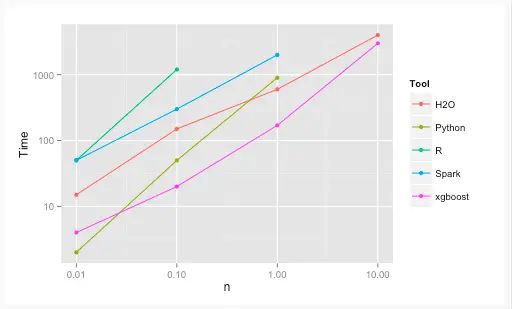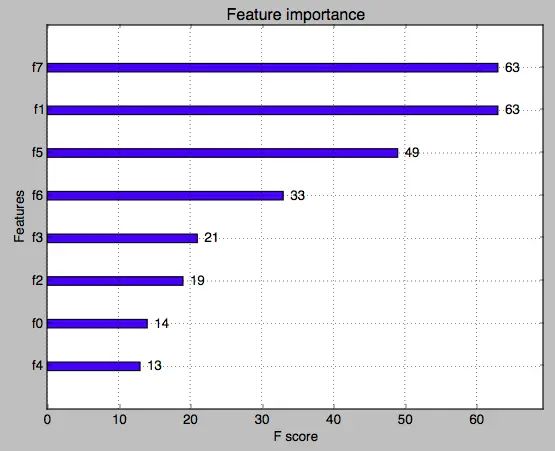xgboost
什么是 xgboost?
XGBoost :eXtreme Gradient Boosting
项目地址:https://github.com/dmlc/xgboost
是由 Tianqi Chen最初开发的实现可扩展,便携,分布式 gradient boosting (GBDT, GBRT or GBM) 算法的一个库,可以下载安装并应用于 C++,Python,R,Julia,Java,Scala,Hadoop,现在有很多协作者共同开发维护。
XGBoost 所应用的算法就是 gradient boosting decision tree,既可以用于分类也可以用于回归问题中。
那什么是 Gradient Boosting?
Gradient boosting 是 boosting 的其中一种方法,所谓Boosting,就是将弱分离器 f_i(x) 组合起来形成强分类器 F(x) 的一种方法。
所以Boosting 有三个要素:
-
A loss function to be optimized:
例如分类问题中用 cross entropy,回归问题用 mean squared error。 -
A weak learner to make predictions:
例如决策树。 -
An additive model:
将多个弱学习器累加起来组成强学习器,进而使目标损失函数达到极小。
Gradient boosting就是通过加入新的弱学习器,来努力纠正前面所有弱学习器的残差,最终这样多个学习器相加在一起用来进行最终预测,准确率就会比单独的一个要高。之所以称为 Gradient,是因为在添加新模型时使用了梯度下降算法来最小化的损失。
第一种 Gradient Boosting 的实现就是AdaBoost(Adaptive Boosting)。
AdaBoost 就是将多个弱分类器,通过投票的手段来改变各个分类器的权值,使分错的分类器获得较大权值。同时在每一次循环中也改变样本的分布,这样被错误分类的样本也会受到更多的关注。
为什么要用 xgboost?
前面已经知道,XGBoost 就是对 gradient boosting decision tree 的实现,但是一般来说,gradient boosting 的实现是比较慢的,因为每次都要先构造出一个树并添加到整个模型序列中。
而 XGBoost 的特点就是计算速度快,模型表现好,这两点也正是这个项目的目标。
表现快是因为它具有这样的设计:
-
Parallelization:
训练时可以用所有的 CPU 内核来并行化建树。
-
Distributed Computing :
用分布式计算来训练非常大的模型。
-
Out-of-Core Computing:
对于非常大的数据集还可以进行 Out-of-Core Computing。
-
Cache Optimization of data structures and algorithms:
更好地利用硬件。
下图就是 XGBoost 与其它 gradient boosting 和 bagged decision trees 实现的效果比较,可以看出它比 R, Python,Spark,H2O 中的基准配置要更快。
另外一个优点就是在预测问题中模型表现非常好,下面是几个 kaggle winner 的赛后采访链接,可以看出 XGBoost 的在实战中的效果。
- Vlad Sandulescu, Mihai Chiru, 1st place of the KDD Cup 2016 competition Link to the arxiv paper
. - Marios Michailidis, Mathias Müller and HJ van Veen, 1st place of the Dato Truely Native? competition. Link to the Kaggle interview
. - Vlad Mironov, Alexander Guschin, 1st place of the CERN LHCb experiment Flavour of Physics competition. Link to the Kaggle interview
.
怎么应用?
先来用 Xgboost 做一个简单的二分类问题,以下面这个数据为例,来判断病人是否会在 5 年内患糖尿病,这个数据前 8 列是变量,最后一列是预测值为 0 或 1。
数据描述:
https://archive.ics.uci.edu/ml/datasets/Pima+Indians+Diabetes
下载数据集,并保存为 “pima-indians-diabetes.csv“ 文件:
https://archive.ics.uci.edu/ml/machine-learning-databases/pima-indians-diabetes/pima-indians-diabetes.data
1. 基础应用
引入xgboost等包
from numpy import loadtxt
from xgboost import XGBClassifier
from sklearn.model_selection import train_test_split
from sklearn.metrics import accuracy_score
分出变量和标签
dataset = loadtxt('pima-indians-diabetes.csv', delimiter=",")
X = dataset[:,0:8]
Y = dataset[:,8]
将数据分为训练集和测试集,测试集用来预测,训练集用来学习模型
seed = 7
test_size = 0.33
X_train, X_test, y_train, y_test = train_test_split(X, Y, test_size=test_size, random_state=seed)
xgboost 有封装好的分类器和回归器,可以直接用 XGBClassifier 建立模型,这里是 XGBClassifier 的文档:
http://xgboost.readthedocs.io/en/latest/python/python_api.html#module-xgboost.sklearn
model = XGBClassifier()
model.fit(X_train, y_train)
xgboost 的结果是每个样本属于第一类的概率,需要用 round 将其转换为 0 1 值
y_pred = model.predict(X_test)
predictions = [round(value) for value in y_pred]
得到 Accuracy: 77.95%
accuracy = accuracy_score(y_test, predictions)
print("Accuracy: %.2f%%" % (accuracy * 100.0))
2. 监控模型表现
xgboost可以在模型训练时,评价模型在测试集上的表现,也可以输出每一步的分数,只需要将
model = XGBClassifier()
model.fit(X_train, y_train)
变为:
model = XGBClassifier()
eval_set = [(X_test, y_test)]
model.fit(X_train, y_train, early_stopping_rounds=10, eval_metric="logloss", eval_set=eval_set, verbose=True)
那么它会在每加入一颗树后打印出 logloss
[31] validation_0-logloss:0.487867
[32] validation_0-logloss:0.487297
[33] validation_0-logloss:0.487562
并打印出 Early Stopping 的点:
Stopping. Best iteration:
[32] validation_0-logloss:0.487297
3. 输出特征重要度
gradient boosting还有一个优点是可以给出训练好的模型的特征重要性,
这样就可以知道哪些变量需要被保留,哪些可以舍弃。
需要引入下面两个类:
from xgboost import plot_importance
from matplotlib import pyplot
和前面的代码相比,就是在 fit 后面加入两行画出特征的重要性
model.fit(X, y)
plot_importance(model)
pyplot.show()
4. 调参
如何调参呢,下面是三个超参数的一般实践最佳值,可以先将它们设定为这个范围,然后画出 learning curves,再调解参数找到最佳模型:
- learning_rate = 0.1 或更小,越小就需要多加入弱学习器;
- tree_depth = 2~8;
- subsample = 训练集的 30%~80%;
接下来我们用GridSearchCV来进行调参会更方便一些:
可以调的超参数组合有:
树的个数和大小(n_estimators and max_depth).
学习率和树的个数(learning_rate and n_estimators).
行列的 subsampling rates(subsample, colsample_bytree and colsample_bylevel).
下面以学习率为例:
先引入这两个类
from sklearn.model_selection import GridSearchCV
from sklearn.model_selection import StratifiedKFold
设定要调节的 learning_rate = [0.0001, 0.001, 0.01, 0.1, 0.2, 0.3],和原代码相比就是在 model 后面加上 grid search 这几行:
model = XGBClassifier()
learning_rate = [0.0001, 0.001, 0.01, 0.1, 0.2, 0.3]
param_grid = dict(learning_rate=learning_rate)
kfold = StratifiedKFold(n_splits=10, shuffle=True, random_state=7)
grid_search = GridSearchCV(model, param_grid, scoring="neg_log_loss", n_jobs=-1, cv=kfold)
grid_result = grid_search.fit(X, Y)
最后会给出最佳的学习率为 0.1
Best: -0.483013 using {‘learning_rate’: 0.1}
print("Best: %f using %s" % (grid_result.best_score_, grid_result.best_params_))
我们还可以用下面的代码打印出每一个学习率对应的分数:
means = grid_result.cv_results_['mean_test_score']
stds = grid_result.cv_results_['std_test_score']
params = grid_result.cv_results_['params']
for mean, stdev, param in zip(means, stds, params):
print("%f (%f) with: %r" % (mean, stdev, param))
-0.689650 (0.000242) with: {'learning_rate': 0.0001}
-0.661274 (0.001954) with: {'learning_rate': 0.001}
-0.530747 (0.022961) with: {'learning_rate': 0.01}
-0.483013 (0.060755) with: {'learning_rate': 0.1}
-0.515440 (0.068974) with: {'learning_rate': 0.2}
-0.557315 (0.081738) with: {'learning_rate': 0.3}


